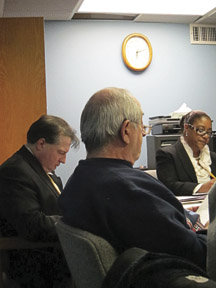The board representing Guttenberg’s subsidized housing had two attorneys sitting at the dais at the last meeting, one of whom admitted that he is representing the executive director rather than the board. However, both attorneys refused to answer questions about why the newer lawyer is needed, and whether federal funds are paying for him.
Since housing officials came under some scrutiny in the last year, a tipster, who asked to remain anonymous, sent an email to the Reporter suggesting that the new lawyer is dealing with their legal troubles – on which several officials have refused to comment.
Resident claims GHA funds are paying for another attorney for personal use
________
After she left the room, Manfredi said he was no longer at liberty to comment.
Corriston, the regular GHA attorney, returned a phone call after the meeting but declined to answer questions about who was paying Manfredi, or why.
There were allegations last year about several members of the housing leadership, including Criscione. According to a deed on a Monmouth Beach, N.J. house, Criscione, then-Assistant Director Maryann Morro, and Housing Manager Fatima Becerril purchased a $770,000 property together at 3 Riverdale Ave. on June 26, 2008.
Last summer’s anonymous complainant alleged that two of the women lived in public housing, but earned too much money to do so. They also said that it was a conflict for a boss to co-own property with her subordinates, or with her tenants.
In HUD’s formula for Hudson County, the income limit for four-person occupancy is $56,900, and real estate assets are supposed to be included in the income limits if the family has net assets over $5,000.
According to a 2006 state employee database, the most recent salary information available, Becerril and Morrow earned $72,267 and $62,229 respectively. Becerril is now the assistant director of the GHA, while Morro is a part-time housing manager.
Guttenberg Mayor Gerald Drasheff said last year that the town turned over the complaints to entities they believed had the appropriate resources to investigate them, including the federal Department of Housing and Urban Development, the U.S. Attorney General’s office, and the Hudson County Prosecutor’s Office.
Recently, HUD said the allegations are under review. The prosecutor’s office declined to comment. The U.S. Attorney’s office normally does not confirm investigations.
“It’s something that just kind of hangs out there, [when] it should be pursued or put to bed,” said Drasheff recently.
New information
Public housing authorities manage affordable, federally subsidized housing in each town, including senior citizen buildings. Thus, residents’ federal income taxes go to support those budgets.
The anonymous sender of the tips questioned why money would be spent on a second attorney when the housing units in the buildings are in need of bathroom and kitchen repairs. He or she also questioned why Manfredi was attending meetings (and sitting at the dais) when the GHA Board was supposed to represent the commissioners and not the paid directors.
Attorneys say ‘no comment’
During the meeting, Criscione happened to mention that the federal Department of Housing and Urban Development had been at the housing office several times, but did not elaborate on why they were there. She said that they had been short-staffed recently and that the office had been a “nightmare.”
She also said that they would be looking to hire more staff soon.
The federal Department of Housing and Urban Development (HUD) manages the federally subsidized low-income and moderate-income housing, and the municipal housing authorities report back to HUD.
After the meeting, the Reporter asked to speak to Criscione about the new allegations, but was told to submit the questions in writing.
On Feb. 9, the Reporter filed an Open Public Records Act request, asking for the Jan. 11 Board of Commissioners’ consent agenda and bill list and the attendance records of the board from Jan. 2009 through Jan. 2010, in order to determine whether the public has been paying for a second attorney.
The faxed letter also asked Criscione for a statement on the allegations.
Later that day, Board Attorney Corriston responded by saying that Criscione has “closed that chapter and doesn’t feel the desire or need to address your question.”
He did not comment on who was paying the second attorney. The Reporter had not received any forms or documents by press time to clarify who was paying him. Once the information is received it will be reported in a future story.
Tricia Tirella may be reached at TriciaT@hudsonreporter.com.
